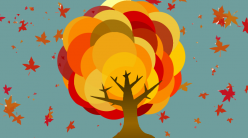A very Christmassy story for children by Olive Thorne Miller.
It was just before Christmas, and Mr. Barnes was starting for the nearest village. The family were out at the door to see him start, and give him the last charges.
“Don’t forget the Christmas dinner, papa,” said Willie.
‘”Specially the chickens for the pie!” put in Nora.
“An’ the waisins,” piped up little Tot, standing on tiptoe to give papa a good-bye kiss.
“I hate to have you go, George,” said Mrs. Barnes anxiously. “It looks to me like a storm.”
“Oh, I guess it won’t be much,” said Mr. Barnes lightly; “and the youngsters must have their Christmas dinner, you know.”
“Well,” said Mrs. Barnes, “remember this, George: if there is a bad storm don’t try to come back. Stay in the village till it is over. We can get along alone for a few days, can’t we, Willie?” turning to the boy who was giving the last touches to the harness of old Tim, the horse.
“Oh, yes! Papa, I can take care of mamma,” said Willie earnestly.
“And get up the Christmas dinner out of nothing?” asked papa, smiling.
“I don’t know,” said Willie, hesitating, as he remembered the proposed dinner, in which he felt a deep interest.
“What could you do for the chicken pie?” went on papa with a roguish look in his eye, “or the plum-pudding?”
“Or the waisins?” broke in Tot anxiously.
“Tot has set her heart on the raisins,” said papa, tossing the small maiden up higher than his head, and dropping her all laughing on the door-step, “and Tot shall have them sure, if papa can find them in S–. Now good-bye, all! Willie, remember to take care of mamma, and I depend on you to get up a Christmas dinner if I don’t get back. Now, wife, don’t worry!” were his last words as the faithful old horse started down the road.
Mrs. Barnes turned one more glance to the west, where a low, heavy bank of clouds was slowly rising, and went into the little house to attend to her morning duties.
“Willie,” she said, when they were all in the snug little log-cabin in which they lived, “I’m sure there’s going to be a storm, and it may be snow. You had better prepare enough wood for two or three days; Nora will help bring it in.”
“Me, too!” said grave little Tot.
“Yes, Tot may help too,” said mamma.
This simple little home was a busy place, and soon every one was hard at work. It was late in the afternoon before the pile of wood, which had been steadily growing all day, was high enough to satisfy Willie, for now there was no doubt about the coming storm, and it would probably bring snow; no one could guess how much, in that country of heavy storms.
“I wish the village was not so far off, so that papa could get back to-night,” said Willie, as he came in with his last load.
Mrs. Barnes glanced out of the window. Broad scattering snowflakes were silently falling; the advance guard, she felt them to be, of a numerous host.
“So do I,” she replied anxiously, “or that he did not have to come over that dreadful prairie, where it is so easy to get lost.”
“But old Tim knows the way, even in the dark,” said Willie proudly. “I believe Tim knows more’n some folks.”
“No doubt he does, about the way home,” said mamma, “and we won’t worry about papa, but have our supper and go to bed. That’ll make the time seem short.”
The meal was soon eaten and cleared away, the fire carefully covered up on the hearth, and the whole little family quietly in bed. Then the storm, which had been making ready all day, came down upon them in earnest.
The bleak wind howled around the corners, the white flakes by millions and millions came with it, and hurled themselves upon that house. In fact, that poor little cabin alone on the wide prairie seemed to be the object of their sport. They sifted through the cracks in the walls, around the windows, and under the door, and made pretty little drifts on the floor. They piled up against it outside, covered the steps, and then the door, and then the windows, and then the roof, and at last buried it completely out of sight under the soft, white mass.
And all the time the mother and her three children lay snugly covered up in their beds fast asleep, and knew nothing about it.
The night passed away and morning came, but no light broke through the windows of the cabin. Mrs. Barnes woke at the usual time, but finding it still dark and perfectly quiet outside, she concluded that the storm was over, and with a sigh of relief turned over to sleep again. About eight o’clock, however, she could sleep no more, and became wide awake enough to think the darkness strange. At that moment the clock struck, and the truth flashed over her.
Being buried under snow is no uncommon thing on the wide prairies, and since they had wood and cornmeal in plenty, she would not have been much alarmed if her husband had been home. But snow deep enough to bury them must cover up all landmarks, and she knew her husband would not rest till he had found them. To get lost on the trackless prairie was fearfully easy, and to suffer and die almost in sight of home was no unusual thing, and was her one dread in living there.
A few moments she lay quiet in bed, to calm herself and get control of her own anxieties before she spoke to the children.
“Willie,” she said at last, “are you awake?”
“Yes, mamma,” said Willie; “I’ve been awake ever so long; isn’t it most morning?”
“Willie,” said the mother quietly, “we mustn’t be frightened, but I think–I’m afraid–we are snowed in.”
Willie bounded to his feet and ran to the door. “Don’t open it!” said mamma hastily; “the snow may fall in. Light a candle and look out the window.”
In a moment the flickering rays of the candle fell upon the window. Willie drew back the curtain. Snow was tightly banked up against it to the top.
“Why, mamma,” he exclaimed, “so we are! and how can papa find us? and what shall we do?”
“We must do the best we can,” said mamma, in a voice which she tried to make steady, “and trust that it isn’t very deep, and that Tim and papa will find us, and dig us out.”
By this time the little girls were awake and inclined to be very much frightened, but mamma was calm now, and Willie was brave and hopeful. They all dressed, and Willie started the fire. The smoke refused to rise, but puffed out into the room, and Mrs. Barnes knew that if the chimney were closed they would probably suffocate, if they did not starve or freeze.
The smoke in a few minutes choked them, and, seeing that something must be done, she put the two girls, well wrapped in blankets, into the shed outside the back door, closed the door to keep out the smoke, and then went with Willie to the low attic, where a scuttle door opened onto the roof.
“We must try,” she said, “to get it open without letting in too much snow, and see if we can manage to clear the chimney.”
“I can reach the chimney from the scuttle with a shovel,” said Willie. “I often have with a stick.”
After much labour, and several small avalanches of snow, the scuttle was opened far enough for Willie to stand on the top round of the short ladder, and beat a hole through to the light, which was only a foot above. He then shovelled off the top of the chimney, which was ornamented with a big round cushion of snow, and then by beating and shovelling he was able to clear the door, which he opened wide, and Mrs. Barnes came up on the ladder to look out. Dreary indeed was the scene! Nothing but snow as far as the eye could reach, and flakes still falling, though lightly.
The storm was evidently almost over, but the sky was gray and overcast.
They closed the door, went down, and soon had a fire, hoping that the smoke would guide somebody to them.
Breakfast was taken by candle-light, dinner–in time–in the same way, and supper passed with no sound from the outside world.
Many times Willie and mamma went to the scuttle door to see if any one was in sight, but not a shadow broke the broad expanse of white over which toward night the sun shone. Of course there were no signs of the roads, for through so deep snow none could be broken, and until the sun and frost should form a crust on top there was little hope of their being reached.
The second morning broke, and Willie hurried up to his post of lookout the first thing. No person was in sight, but he found a light crust on the snow, and the first thing he noticed was a few half-starved birds trying in vain to pick up something to eat. They looked weak and almost exhausted, and a thought struck Willie.
It was hard to keep up the courage of the little household. Nora had openly lamented that to-night was Christmas Eve, and no Christmas dinner to be had. Tot had grown very tearful about her “waisins,” and Mrs. Barnes, though she tried to keep up heart, had become very pale and silent.
Willie, though he felt unbounded faith in papa, and especially in Tim, found it hard to suppress his own complaints when he remembered that Christmas would probably be passed in the same dismal way, with fears for papa added to their own misery.
The wood, too, was getting low, and mamma dared not let the fire go out, as that was the only sign of their existence to anybody; and though she did not speak of it, Willie knew, too, that they had not many candles, and in two days at farthest they would be left in the dark.
The thought that struck Willie pleased him greatly, and he was sure it would cheer up the rest. He made his plans, and went to work to carry them out without saying anything about it.
He brought out of a corner of the attic an old boxtrap he had used in the summer to catch birds and small animals, set it carefully on the snow, and scattered crumbs of corn-bread to attract the birds.
In half an hour he went up again, and found to his delight he had caught bigger game–a poor rabbit which had come from no one knows where over the crust to find food.
This gave Willie a new idea; they could save their Christmas dinner after all; rabbits made very nice pies.
Poor Bunny was quietly laid to rest, and the trap set again. This time another rabbit was caught, perhaps the mate of the first. This was the last of the rabbits, but the next catch was a couple of snowbirds. These Willie carefully placed in a corner of the attic, using the trap for a cage, and giving them plenty of food and water.
When the girls were fast asleep, with tears on their cheeks for the dreadful Christmas they were going to have, Willie told mamma about his plans. Mamma was pale and weak with anxiety, and his news first made her laugh and then cry. But after a few moments given to her long pent-up tears, she felt much better and entered into his plans heartily.
The two captives up in the attic were to be Christmas presents to the girls, and the rabbits were to make the long anticipated pie. As for plum-pudding, of course that couldn’t be thought of.
“But don’t you think, mamma,” said Willie eagerly, “that you could make some sort of a cake out of meal, and wouldn’t hickory nuts be good in it? You know I have some left up in the attic, and I might crack them softly up there, and don’t you think they would be good?” he concluded anxiously.
“Well, perhaps so,” said mamma, anxious to please him and help him in his generous plans. “I can try. If I only had some eggs–but seems to me I have heard that snow beaten into cake would make it light–and there’s snow enough, I’m sure,” she added with a faint smile, the first Willie had seen for three days.
The smile alone he felt to be a great achievement, and he crept carefully up the ladder, cracked the nuts to the last one, brought them down, and mamma picked the meats out, while he dressed the two rabbits which had come so opportunely to be their Christmas dinner. “Wish you Merry Christmas!” he called out to Nora and Tot when they waked. “See what Santa Claus has brought you!”
Before they had time to remember what a sorry Christmas it was to be, they received their presents, a live bird, for each, a bird that was never to be kept in a cage, but fly about the house till summer came, and then to go away if it wished.
Pets were scarce on the prairie, and the girls were delighted. Nothing papa could have brought them would have given them so much happiness.
They thought no more of the dinner, but hurried to dress themselves and feed the birds, which were quite tame from hunger and weariness. But after a while they saw preparations for dinner, too. Mamma made a crust and lined a deep dish–the chicken pie dish–and then she brought a mysterious something out of the cupboard, all cut up so that it looked as if it might be chicken, and put it in the dish with other things, and then she tucked them all under a thick crust, and set it down in a tin oven before the fire to bake. And that was not all. She got out some more cornmeal, and made a batter, and put in some sugar and something else which she slipped in from a bowl, and which looked in the batter something like raisins; and at the last moment Willie brought her a cup of snow and she hastily beat it into the cake, or pudding, whichever you might call it, while the children laughed at the idea of making a cake out of snow. This went into the same oven and pretty soon it rose up light and showed a beautiful brown crust, while the pie was steaming through little fork holes on top, and sending out most delicious odours.
At the last minute, when the table was set and everything ready to come up, Willie ran up to look out of the scuttle, as he had every hour of daylight since they were buried. In a moment came a wild shout down the ladder.
“They’re coming! Hurrah for old Tim!”
Mamma rushed up and looked out, and saw–to be sure–old Tim slowly coming along over the crust, drawing after him a wood sled on which were two men.
“It’s papa!” shouted Willie, waving his arms to attract their attention.
“Willie!” came back over the snow in tones of agony. “Is that you? Are all well?”
“All well!” shouted Willie, “and just going to have our Christmas dinner.”
“Dinner?” echoed papa, who was now nearer.
“Where is the house, then?”
“Oh, down here!” said Willie, “under the snow; but we’re all right, only we mustn’t let the plum-pudding spoil.”
Looking into the attic, Willie found that mamma had fainted away, and this news brought to her aid papa and the other man, who proved to be a good friend who had come to help.
Tim was tied to the chimney, whose thread of smoke had guided them home, and all went down into the dark room. Mrs. Barnes soon recovered, and while Willie dished up the smoking dinner, stories were told on both sides.
Mr. Barnes had been trying to get through the snow and to find them all the time, but until the last night had made a stiff crust he had been unable to do so. Then Mrs. Barnes told her story, winding up with the account of Willie’s Christmas dinner. “And if it hadn’t been for his keeping up our hearts I don’t know what would have become of us,” she said at last.
“Well, my son,” said papa, “you did take care of mamma, and get up a dinner out of nothing, sure enough; and now we’ll eat the dinner, which I am sure is delicious.”
So it proved to be; even the cake, or pudding, which Tot christened snow pudding, was voted very nice, and the hickory nuts as good as raisins. When they had finished, Mr. Barnes brought in his packages, gave Tot and the rest some “sure-enough waisins,” and added his Christmas presents to Willie’s; but though all were overjoyed, nothing was quite so nice in their eyes as the two live birds.
After dinner the two men and Willie dug out passages from the doors, through the snow, which had wasted a good deal, uncovered the windows, and made a slanting way to his shed for old Tim. Then for two or three days Willie made tunnels and little rooms under the snow, and for two weeks, while the snow lasted, Nora and Tot had fine times in the little snow playhouses.





